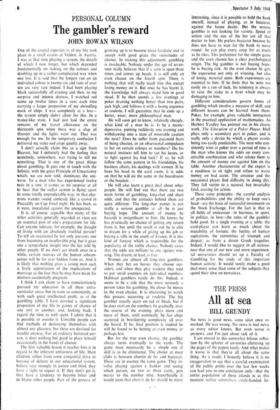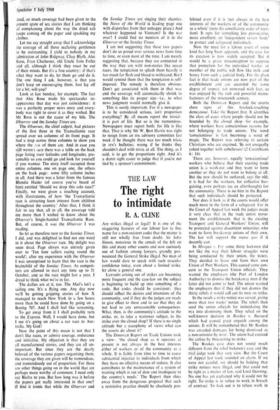All at sea
THE PRESS BILL GRUNDY
No news is good news, some idiot once re- marked. He was wrong. No news is bad news, as every editor knows. But even worse is un-news, and I'm just about sick of it.
I am moved to this somewhat bilious reflec- tion by the splatter of un-stories cluttering up the pages of the papers lately. And what makes it worse is that they're all about the same thing. As a result, I honestly believe it is no exaggeration to say that a careful examination of the public prints over the last few weeks can lead you to one conclusion only—that the entire population of these islands is at this moment sailing somewhere single-handed. In-
deed, so much coverage had been given to the present spate of sea stories that I am thinking of complaining about the way the dried salt keeps coming off the paper and speckling my clothes.
Let me say straight away that I acknowledge the courage of all those seafaring gentlemen to be outstanding. I yield to nobody in my admiration of John Ridgway, Chay Blyth, Alec Rose, Fran Chichester, old Uncle Tom Follet and all, although I think they must be out of their minds. But it's a free country : if that's what they want to do, let them go and do it.
The one thing I ask, however, is that you don't keep on encouraging them. Just lay off for a bit, will you?
Look at last Sunday, for example. The fact that Alec Rose made his spectacular re- appearance that day was just coincidence: it was a perfectly proper news story and every- body was right to cover it as they wished. But Mr Rose is not the cause of my bile. The Observer and the Sunday Times are.
The Observer, the chief culprit, had pictures of the first three in the Transatlantic race spread over six columns of its front page. It had a map across three columns to show you where the rest of them are. And. in case you still weren't sure there was a table on the back page listing their latitudes and longitudes, pre- suinably so you could go and look for yourself if you wanted. The story itself occupied three entire columns, one on page one, the others on the back page: some fifty column inches in all. And there was a letter froni the famous Blondie Hasler (of course you've heard of him) entitled 'Should we drop this solo race?'
Finally, we were given a touching account, with illustrations, of how 'the Transatlantic race is attracting keen interest from children throughout the country.' After that, I think it fair to say that, all in all, the coverage told me more than I wished to know about the Observer's Single-handed Transatlantic Race. But, of course, it was the Observer I was reading.
So let us therefore turn to the Sunday Times. I did, and was delighted to find not one word in it about the Observer race. My delight was soon dead. Page eleven was entirely given over to 'Ten lone sailors racing round the world'; after my experience with the Observer I was unsurprised to learn that the race is the brainchild of the Sunday Times. As competi- tors are allowed to start any time up to 31 October, and as the race might last a year, I dread to think what we're in for.
The dailies are at it, too. The Mail's isn't a sailing one. It's a flying one. Any day now we'll be getting gripping stories of how X managed to reach New York in a few hours more than he could have done by going on a Boeing 707. And I shall feel like screaming.
To get away from it I shall probably turn to the Express. Well, I would have done, but I see it's going on about a car race to Aus- tralia. My God!
Now the point of this moan is not that I don't like races, or admire courage, endurance and initiative. My objection is that they are all manufactured stories, and they are all un- important. But since they are the dearly beloved of the various papers organising them, the coverage they are given will be tremendous, and tremendously out of proportion. For there are other things going on in the world that are perhaps more worthy of comment. I need only say Biafra to you. But how long was it before the papers got really interested in that one? (I find it ironic that while the Observer and
the Sunday Times are singing their shanties, the News of the World is leading page one with dispatches from that unhappy place.) And whatever happened to Vietnam? Is the war over? I could find no mention of it in the Observer or the Sunday Times.
I am not suggesting that these two papers don't do us proud over serious news from time to time, or even most of the time. I am merely suggesting that, because they are connected in the way they are with non-stories like ocean races, the temptation to splash them heavily is too much for flesh and blood to withstand. But I would remind them that the temptation is self- imposed. The remedy is therefore obvious. Don't get associated with them in that way and the coverage will automatically shrink to something like its proper size—i.e., to what news judgment would normally give it.
This is surely important. For if a newspaper is to be considered serious, isn't proportion everything? By all means report the trivial: it is part of life. But so is the tremendous. Newspapers must report both; for life is like that. That is why Mr W. Best Harris was right to resign from an rrA advisory committee last week if he thought there was too much trivia in ITN'S bulletins; wrong if he thinks they shouldn't deal with trivia at all. The thing, as I said, is to get the proportions right. And it's a damn sight easier to judge that if you're not tied by a sponsor's commitment.











































 Previous page
Previous page